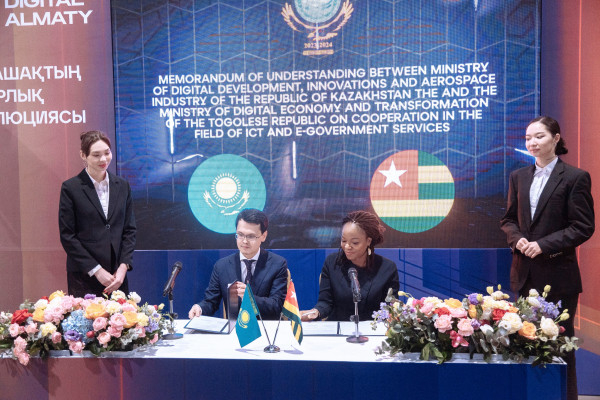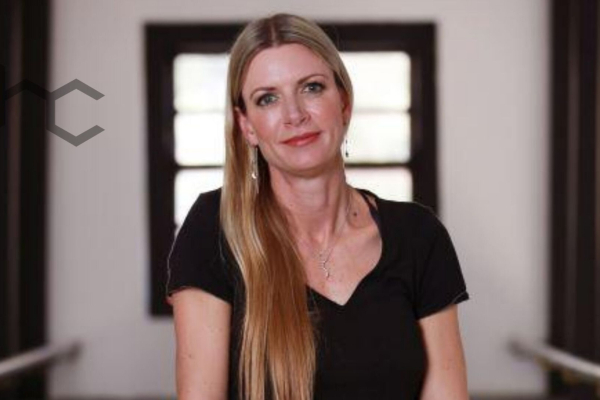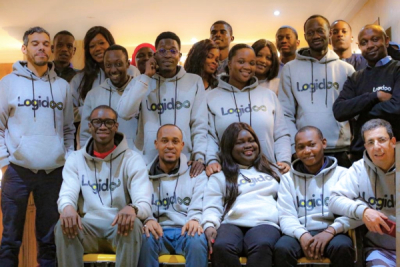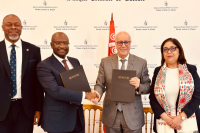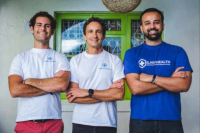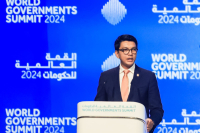Togo's push towards digitalization has gained momentum following the creation of Agence Togo Digital, a government agency overseeing digital projects. To accelerate progress, the country is actively seeking partnerships.
Togo and Kazakhstan have expanded their bilateral collaboration in information and communication technologies (ICT) through a memorandum of understanding (MoU) signed at the Digital Almaty Forum.
Signed by Togo's Digital Economy Minister Cina Lawson and Kazakhstan's Digital Development Minister Bagdat Mussin, the MoU focuses on supporting the "Togo Digital 2025" strategy, particularly digitizing administration and citizen services.
This cooperation aligns with a broader rapprochement between the two countries, following President Faure Gnassingbé's visit to Astana in November 2023 and the upcoming prospecting mission by a Kazakh delegation to Togo this week.
Under the MoU, Kazakhstan will assist Togo in implementing its digital agenda, drawing on its own e-governance experience. Kazakhstan launched its eGov.kz portal in 2006, offering over 200 automated services, and ranks 28th globally in the UN's e-Government Development Index (EGDI).
Similarly, Togo launched its national public services portal in 2022, including services like passport applications and building permits. This partnership aims to accelerate digitization in Togo, leveraging Kazakhstan's expertise.
Samira Njoya
By combining cutting-edge technology and philanthropy, the entrepreneur is revolutionizing not only the insurance industry but also the way surplus funds are used to support important causes.
Sumarie Greybe (photo), a South African insurance actuary, co-founded Naked Insurance in 2016 with partners Alex Thomson and Ernest North. The company, which leverages artificial intelligence, aims to revolutionize the insurance sector by offering a fully digital process, from underwriting to claims, to customers. Quotes can be obtained in 90 seconds, and customers can underwrite instantly without speaking to an agent.
Naked Insurance's liability insurance starts at ZAR 50 (approximately $2.50), which is several times cheaper than plans offered by other insurers, according to Greybe. The company is structured to redistribute surplus funds, resulting from claims payments below annual forecasts, to causes selected by customers, encompassing a wide range of initiatives, from early childhood development programs to efforts to improve animal welfare.
Greybe, who graduated from the University of Pretoria with a Bachelor's degree in Actuarial Science in 1994, built a career as one of South Africa's leading short-term insurance actuaries. She served as actuarial advisor to many of South Africa's large insurers before co-founding Naked Insurance. In 2011, Greybe's firm, Quindiem Consulting, was acquired by EY, where she became a partner and head of EY Africa's Actuarial Services Short Term Insurance Practice.
Naked Insurance's customer-centric focus and commitment to sustainability are key to its success. The company's approach to philanthropy aligns with its mission to improve the community and the environment. By returning excess funds to causes chosen by customers, Naked Insurance aims to foster a sense of shared purpose and responsibility.
Melchior Koba
African Leadership Experience (ALX) is now accepting applications for its 2024 cohort, targeting young Africans aged 18-34 interested in tech skills. The program offers online courses in in-demand fields like AI Essentials, software engineering, data analytics, CRM, and AWS Cloud Computing.
ALX, which has trained over 100,000 students since 2021, aims to reach 750,000 by year-end. It partners with organizations like Mastercard Foundation to offer tuition-free access to programs typically costing between $7,500 and $39,750 in Africa, and $14,500 to $79,500 in Europe and North America. Applications are open until February 27.
Hikmatu Bilali
Technology entrepreneurs are developing artificial intelligence (AI)- powered tools designed to help businesses manage and reduce their legal spending, offering a potential alternative to traditional law firms.
Founded in 2020 and backed by $2.6 million in funding, Hence Technologies, a Rwanda-UK startup, offers a web-based platform to assist businesses in finding suitable legal counsel.
Currently lacking a mobile app, Hence connects users with lawyers through its website. After booking an initial consultation, users have the opportunity to discuss their specific needs and ask questions about the platform.
The company aims to differentiate itself by using data and algorithms to match businesses with the most appropriate lawyers based on the nature of their legal issues, their location, and cost considerations. This differs from "marketplace solutions" that prioritize facilitating transactions, according to co-founder Steve Heitkamp.
We "built a product that is helping people find the right lawyers; a starting place for their needs," Heitkamp stated in 2022.
With operations spanning three continents and headquartered in Kigali, Rwanda, Hence plans to leverage local tech talent to expand its services and target larger companies globally.
Adoni Conrad Quenum
Tunisian venture capital fund 216Capital Ventures participated in a $1.5 million funding round for Logidoo, a pan-African logistics startup, according to a press release issued on Tuesday.
The funds will be used for expansion into key markets across Africa, including Congo, Gambia, Guinea-Conakry, Mali, and Mauritania, the press release stated.
Committed to boosting digital entrepreneurship and bridging the digital divide, Kinshasa-based incubator Nguvu Tech is nurturing innovative talent to shape the future of the Democratic Republic of Congo (DRC).
Founded in Goma in 2020, Nguvu Tech aims to empower young Congolese by fostering digital entrepreneurship and nurturing creativity. Led by CEO Robin Businde, the incubator offers a variety of programs to cultivate tech skills and entrepreneurial spirit.
Nguvu Tech offers training, workshops, and coaching in diverse fields like education, technology, and entrepreneurship. These programs, available online and in-person, provide young people across the DRC and Africa with skills and support to develop their ideas.
Beyond training, the incubator assists startups with website and app development, graphic design, and IT systems. This comprehensive approach helps young entrepreneurs navigate the digital landscape and contribute to the DRC's economic and social development.
Melchior Koba
The Pan-African Payment and Settlement System (PAPSS) announced on Monday the addition of the Central Bank of Tunisia (BCT) as its thirteenth member, bolstering efforts to facilitate seamless cross-border payments and promote financial integration across Africa. This move reflects the BCT's aim to support economic growth in Tunisia and the wider region by offering Tunisian businesses and citizens benefits like improved payment efficiency, reduced transaction costs, and expanded opportunities for intra-African trade and payments.
Driven by a mission to improve healthcare accessibility, Senegalese entrepreneur Boubacar Sagna has developed an on-demand platform connecting patients with medical professionals.
Afya Care is an e-health solution developed by a Senegalese startup. Founded in 2014 by Boubacar Sagna, the startup, previously known as Yenni, aims to provide seamless access to healthcare services and medicines through its innovative platform. Users can access healthcare in hospitals and health centers, as well as purchase medicines in pharmacies, by making payments from a digital wallet. The platform, which boasts a mobile app accessible on iOS and Android, allows users to create accounts and access various services, including the ability to pay for consultations, medication, or health insurance.
One of the key features of Afya Care is its digital wallet, which is topped up by mobile money, specifically Orange Money and Wave. Once funds are in the Afya Care account, they can only be used for the services offered by the startup, such as paying for one's care, or that of a third party, or participating in crowdfunding campaigns to help third parties. The startup claims to have a network of over a thousand doctors and pharmacists, ensuring that its users have access to a wide range of healthcare professionals.
In addition to its core services, Afya Care allows users to donate health credits to third parties, with the assurance that the credits will be used for healthcare purposes and that the treatment received must come from a certified network, thus preventing the use of counterfeit medicines. The startup has ambitious plans to expand to other markets in the West African sub-region, with Guinea, Mali, and Côte d'Ivoire being among the potential destinations. Since its launch, the Android version of the mobile application has been downloaded more than a hundred times, according to Play Store data.
Adoni Conrad Quenum
Kenyan health technology startup Ilara Health announced on Tuesday, February 13, the successful completion of a $4.2 million financing round. The funds will be used to develop its technology and expand into new markets in the East African sub-region.
Sub-Saharan Africa is poised to see the fastest growth in demand for digital skills globally, according to the International Finance Corporation (IFC). This poses a significant challenge in preparing young people for these emerging opportunities.
Madagascar and the United Arab Emirates partnered on Tuesday to train over a million young Malagasy people in new technologies through the "Digital School" and "Coders Initiative" projects. The initiative, announced at the World Government Summit in Dubai, aims to equip youth with in-demand digital skills to improve their employability and contribute to Madagascar's economic development.
“The future lies in preparing our future generations to face challenges with innovative technological weapons that will forge their world of tomorrow. The hopes of an entire generation lie in our hands, the leaders of today. We must assist them towards a better future,” President Andry Rajoelina (photo) stated.
Digital School, already established in eight countries, will provide flexible learning opportunities through digital training centers in Madagascar. These centers will utilize advanced technologies like artificial intelligence to complement the national curriculum and develop students' skills in areas like coding and data analysis. The "Coders Initiative" will likely focus on more intensive training programs for specific IT professions.
With over 1.5 million instructors trained and 60,000 students enrolled globally, Digital School has a proven track record of success. Its expansion into Madagascar, coupled with the "Coders Initiative", has the potential to significantly improve the digital literacy and employability of young Malagasy people.
Samira Njoya
More...
With his public international law training, he is disrupting the African legal landscape by developing innovative digital solutions that make quality legal services more accessible to citizens on the continent.
Daniel Bobasha (photo) is a multifaceted professional hailing from the Democratic Republic of Congo with experience in the fields of entrepreneurship, writing, and banking. A graduate in international public law from the Protestant University of Congo, Bobasha is the founder and CEO of Mibeko Tech, a legaltech startup that is revolutionizing the legal sector in Africa.
Mibeko Tech, under Bobasha's leadership, has designed and developed digital solutions to cater to the specific needs of the legal industry in Africa. Not only is the company a pioneer in this regard, but it also serves as a hub and think tank dedicated to fostering the growth of the legaltech sector across the continent. One of the notable achievements of Mibeko Tech is the development of an app that seamlessly connects Congolese individuals with 135 qualified lawyers, enhancing access to legal services.
In addition to its innovative technological solutions, Mibeko Tech offers a range of online courses covering various subjects, such as legal watch design and the legal challenges of innovation. The startup has also facilitated the purchase of over 28 legal documents through its platform.
Bobasha's entrepreneurial endeavors extend beyond the realm of legaltech. Mibeko Tech has launched #FundaYe, an initiative aimed at preventing and addressing sexual harassment and gender-based violence. This platform not only empowers women by providing them with essential knowledge about their rights and avenues for support but also streamlines the process of lodging complaints. Its CEO is, since January 2024, a banker at Trust Merchant Bank. Before this, he served as the head of digital banking products at EquityBCDC, a part of the Equity Group, a leading Kenyan banking entity with a strong presence across 10 African countries, including the Democratic Republic of Congo.
Melchior Koba
The Angolan government is launching a series of digital projects to streamline access to public services and meet citizens' demands for electronic solutions. However, the success of these initiatives may hinge on improving the country's internet infrastructure.
The implementation of Angola's ambitious Digital Acceleration Program (PADA) is encountering challenges, with limited internet access across the country emerging as a major hurdle.
During a public consultation session on PADA, Meick Afonso (photo), Director General of the Institute of Administrative Modernization (IMA), highlighted the issue to stakeholders, stating that for the transformation to be successful, it is essential that every citizen is connected.
PADA, a $300 million initiative funded by the World Bank, aims to drive digital inclusion, expand access to public services, and stimulate the digital economy. Ultimately, it seeks to transform Angola into a fully digitized society, streamlining access to administrative documents.
However, achieving this vision hinges on a reliable internet infrastructure. While recent developments such as Angola's connection to Meta's 2Africa fiber optic cable and a $249 million loan for a national broadband project bode well, current penetration remains low.
Statistics from the Angolan Institute of Communications (INACOM) indicate 10.08 million internet users in the country. However, a December 2023 report by the International Telecommunications Union (ITU) ranks Angola 24th in Africa for ICT development, with a score of only 44.1 out of 100.
Samira Njoya
In an ever-changing entrepreneurial environment, Tanzania's Dar Teknohama Business Incubator stands out for its commitment to supporting and promoting the most promising technological initiatives.
The Dar Teknohama Business Incubator (DTBi), established in 2011 by the Tanzanian Commission for Science and Technology (COSTECH) in collaboration with InfoDev, a World Bank program, is a hub for technology startups. Under the guidance of CEO George Mulamula, it is dedicated to fostering innovation and supporting entrepreneurs in Tanzania.
DTBi is focused on promoting the growth of emerging companies in the information and communication technology sector and innovative startups and individuals. The goal is to stimulate job creation and bolster the national economy. With the ambition to be the central hub for technology startups, DTBi actively identifies and delivers value-added services essential for the success of its clients, thereby contributing to their growth and market success.
The incubator provides a wide array of business development services designed to enhance the market survival chances of early-stage ICT startups. These services encompass access to shared resources, assistance in securing financing and market access, credible support, strategic advice, and robust business management. Furthermore, DTBi encourages the formation of professional networks to keep abreast of technical trends and seize market access opportunities, thereby creating a conducive environment for business growth and success.
DTBi provides workspaces and coworking spaces to encourage collaboration. It has implemented training and financial management programs. With the backing of telecom operators such as Tigo, Airtel, and the Tanzania Communications Regulatory Authority (TCRA), DTBi has achieved more than 38 innovations and 33 incubations. The incubator has generated over 659 direct jobs and more than 17,000 indirect jobs.
Melchior Koba
The Fate Foundation, in collaboration with Orange Corners Nigeria and the Kingdom of the Netherlands, has launched applications for the tenth cohort of its incubation program for Nigerian entrepreneurs. The six-month program offered both physically and virtually will provide participants with capacity-building sessions, expert advice and mentorship, industry visits, and networking opportunities. The deadline for applications is February 18.


